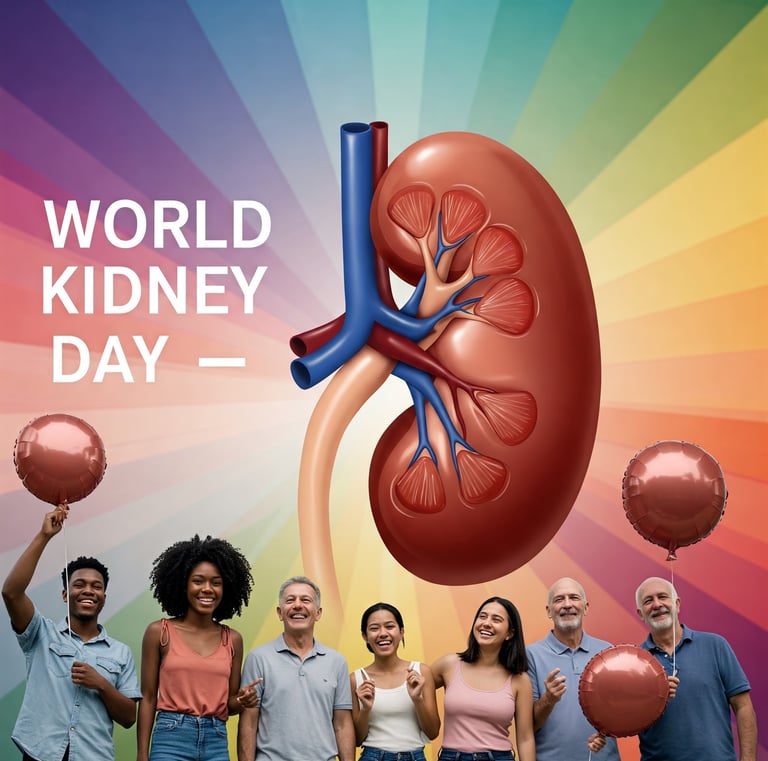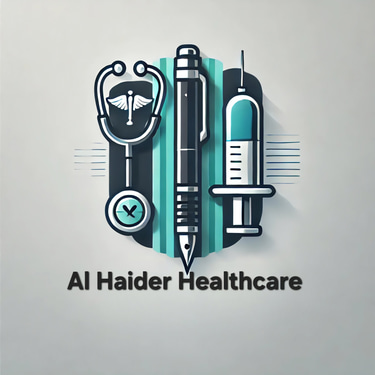Al Haider Healthcare 🏥
World Kidney Day: Importance, Prevention, and Risk Factors Explained
World Kidney Day is a global campaign dedicated to raising awareness about kidney health and preventing kidney disease. Learn about the vital functions of kidneys, why their health matters, the history and significance of World Kidney Day, and how you can protect your kidneys through simple lifestyle changes. Discover risk factors, preventive measures, and expert insights from leading health organizations.
Dr. Afzal Ali
3/13/20253 min read


What Are Kidneys?
The kidneys are two bean-shaped organs located on either side of the spine, just below the ribcage. Each kidney is approximately the size of a fist and plays a crucial role in filtering waste products, excess fluids, and impurities from the blood, which are then excreted as urine. Beyond filtration, kidneys regulate electrolyte balance, maintain blood pressure, produce hormones that influence red blood cell production, and support bone health by managing calcium and phosphorus levels.
World Kidney Day, observed annually on the second Thursday of March, serves as a global campaign to raise awareness about the importance of kidney health and to reduce the impact of kidney diseases worldwide. worldkidneyday.org In 2025, this significant day falls on March 13th, uniting individuals and organizations to emphasize preventive behaviors, risk factors, and strategies for maintaining kidney health.
Why Is Kidney Health Important?
Healthy kidneys are vital for overall well-being. They ensure the removal of waste and toxins, regulate essential bodily functions, and maintain internal balance. Impaired kidney function can lead to the accumulation of harmful substances, resulting in health complications such as hypertension, anemia, weakened bones, nerve damage, and cardiovascular diseases. In severe cases, kidney failure may occur, necessitating dialysis or a kidney transplant.
History and Purpose of World Kidney Day
World Kidney Day was first observed in 2006 as a joint initiative of the International Society of Nephrology (ISN) and the International Federation of Kidney Foundations (IFKF). The primary objective is to raise awareness about the significance of our kidneys and to highlight that kidney diseases are common, harmful, and often manageable. Each year, the campaign focuses on a specific theme to address various aspects of kidney health. For 2025, the theme is "Are Your Kidneys OK? – Detect early, protect kidney health," emphasizing the importance of early detection and preventive measures.
How to Maintain Kidney Health
Maintaining kidney health involves adopting a proactive and healthy lifestyle. Key recommendations include:
Stay Hydrated: Consuming adequate fluids helps the kidneys clear sodium, urea, and toxins from the body. While individual needs vary, a general guideline is about 2 liters (approximately 8 glasses) of water daily.
Healthy Diet: Embrace a balanced diet rich in fruits, vegetables, whole grains, and low-fat dairy products. Limiting salt, processed foods, and excessive protein intake can reduce the risk of kidney damage.
Regular Exercise: Engage in physical activities to maintain optimal weight, control blood pressure, and enhance overall health.
Monitor Blood Pressure and Blood Sugar: Regular check-ups can detect hypertension and diabetes early, both of which are leading causes of kidney disease.
Avoid Overuse of Over-the-Counter Medications: Excessive use of pain relievers like nonsteroidal anti-inflammatory drugs (NSAIDs) can harm the kidneys. Use such medications only as directed.
Quit Smoking: Smoking reduces blood flow to the kidneys and increases the risk of kidney disease.
Limit Alcohol Consumption: Excessive alcohol intake can lead to high blood pressure, a risk factor for kidney disease.
Risk Factors for Kidney Disease
Several factors can increase the risk of developing kidney disease:
Diabetes: Approximately 1 in 3 adults with diabetes has chronic kidney disease (CKD).
High Blood Pressure: About 1 in 5 adults with high blood pressure has CKD.
Heart Disease: Individuals with heart disease are at increased risk for kidney disease.
Obesity: Excess weight can lead to conditions that harm the kidneys.
Family History: A family history of kidney disease can elevate one's risk.
Age: The risk of CKD increases with age.
Smoking: Tobacco use can impair kidney function.
Certain Medications: Long-term use of certain drugs, such as NSAIDs, can damage the kidneys.
Recognizing these risk factors is essential for early detection and prevention. Regular screenings and consultations with healthcare professionals can lead to timely interventions, reducing the progression of kidney disease.
Conclusion
World Kidney Day serves as a poignant reminder of the significance of our kidneys and the necessity of maintaining their health. By adopting a healthy lifestyle, being aware of risk factors, and seeking regular medical advice, we can protect our kidneys and ensure a better quality of life. At Al-Haider Healthcare, we are committed to promoting kidney health and supporting our community in making informed health choices.
For more information and resources, visit the official World Kidney Day website.
Kidney Health: World Kidney Day
© 2025. All rights reserved.
Subscribe to our newsletter
Contact Us
Visit Al Haider Healthcare for primary healthcare services and expert medical care.
Location
Semri-Sathi, West Champaran, Bihar, India 845449
Hours
OPD 9 AM - 9 PM
24*7 Emergency Sevice
Mob;
alhaiderhealthcare@gmail.com
+91-9060198636
Email;
www.ahchospital.in
Web;
